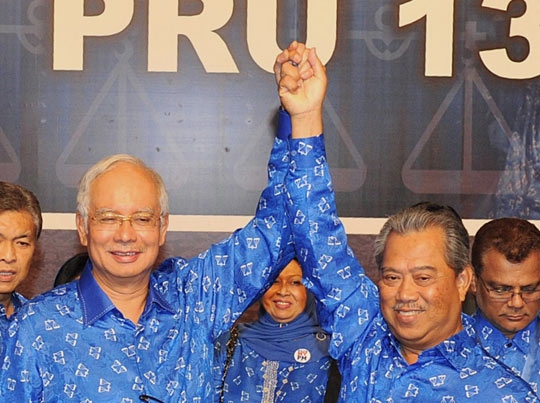AND so the Barisan Nasional (BN) has managed to continue being in power by securing a simple majority in Parliament in the 13th general election since the country’s independence (GE13). At the same time, BN has also managed to hold on to Perak which it wrested from Pakatan Rakyat (PR) in a 2009 coup d’état, and to take Kedah from the PAS-run government. Additionally, BN has also retained Johor, Malacca, Negeri Sembilan, Pahang, Perlis, Terengganu, Sabah and Sarawak.

Still PR scored some major wins. Most notably, the DAP retained Penang, PKR held on to Selangor, and PAS to Kelantan with two-third majorities. PR also made solid gains in Umno’s stronghold of Johor. On top of that, BN under Datuk Seri Najib Razak’s leadership, failed to win a two-thirds majority in Parliament. In fact, BN has won only 133 parliamentary seats. This is seven less than what it secured in 2008, and far short of the 160-seat win it projected for itself.
The Nut Graph speaks to several analysts for an instant reaction to the polls results.
Emeritus Professor Clive Kessler, School of Social Sciences, University of New South Wales

There have been no big surprises in this election. BN has been re-elected with a simple majority and Umno/BN has lost massive non-Malay support.
By and large, it seems that in the Malay Malaysian areas, BN has held on to much of its vote while running a kind of genteel version of the Perkasa position. This is while the two Perkasa candidates Zulkifli Noordin and Datuk Ibrahim Ali have actually lost. So by doing a soft-sell, polite version of the Perkasa ideology, Umno has managed to stay on top.
If that is the case, the implications are fairly worrying. First, it turns on Malay, non-Malay polarisation. Secondly, it will likely move Umno to a far more Malay ascendant position and to Umno shoring up and buttressing its pro-Malay stance.
Najib’s remarks on a Chinese tsunami is basically his way of saying BN has lost non-Malay, especially Chinese Malaysian support. It’s not a Chinese tsunami. The way that BN has ruled has made it impossible for non-Malays to be credible leaders within BN. It hasn’t been possible for its non-Malay leaders to have national credibility. With Umno’s de facto or soft sell Perkasa position, it is impossible for Chinese Malaysians to go on supporting them and makes them extremely unpalatable and un-user friendly to Chinese Malaysian voters. Najib can’t call it a Chinese tsunami when the policies Umno have pursued have deprived it of much of the Chinese Malaysian support.
Umno is now choosing to rule as it has since it reacted to the 2008 elections. It is not ruling as when it formed the government at independence as a centrist party. It has instead gone back to 1946, where it portrays Malaysia as a Malay land and others have to accept the terms that Malays are prepared to give them.
Both sides of the political divide have suffered high profile defeats. This is what happens when there’s a competitive political system.
This election was a test for a lot of people. It was a major test for Datuk Seri Anwar Ibrahim. It was his moment of truth to challenge the BN, but it looks like he fell short. It was also a major test for Najib. BN has won the elections but I’m not sure whether Najib has really established his credibility. It’s a very small victory at an enormous cost.
Ratna Osman, Sisters In Islam executive director

For PR, the fact that they managed to wrest a sizeable number of areas which were traditionally known as BN strongholds can be viewed as a win. They have been able to penetrate areas traditionally untouched, thereby sending a message to the BN that the rakyat wants to hold the ruling government accountable.
We’ve seen a new Malaysia emerge over the last three years. We’ve seen more voters turn out than ever before in this election. That’s an indication of a more empowered rakyat.
On what the results indicate for women: the total number of women candidates fielded was around 10% (22 out of 222), so we know that this time around, we will not even reach 10% representation in Parliament. In the last Parliament, women made up only 10% of the total number of MPs while in the state assemblies, women made up a dismal 8%.
This does not bode well for women in Malaysia. A critical mass of women in Parliament is crucial in order to capture the diversity of women’s issues, for the attention of policy-makers.
Nevertheless, there are reasons to remain hopeful. Young women politicians like Nurul Izzah Anwar and Murni Hidayah (contesting on a PR ticket in Paya Besar) are inspiring other young women to enter politics. I believe we’ll be seeing more of that.
On another matter, PAS will not be able to make hudud a reality – either at the state or federal level. PAS’s Syura Council might well consider listening to the more moderate and progressive voices within its rank with regards to the applicability of hudud in this day and age. A cause for concern worth mentioning would be if Umno, in wanting to build greater support among the Malay-Muslim majority in the next five years, strikes some kind of union or cooperation with PAS.
June Rubis, indigenous rights advocate based in Kota Kinabalu

This is the best show for the opposition in the state. I hope people don’t give up. Some of us tend to forget how large Sarawak is and how costly it is to campaign and reach out to rural voters here compared to other states. BN has the state machinery at their disposal, the opposition politicians don’t. Vote buying is also another huge problem. I think we should look at the results in a more positive light. In seats like Baram, it was a very close fight. PKR’s Roland Engan almost won [if votes weren’t split by an independent]. It shows that the locals don’t want the Baram Dam and are voting against BN.
But there’s also still a lot of fear about West Malaysian colonisation and infighting within PR in Sarawak. They need to get their act together. If they can keep up the momentum, I still have hope that they can do better in the next elections. I would also like to add that the change for Sarawak may not necessarily come from PR. It would be different and uniquely Sarawakian. We need more Sarawakians to step up and take leadership roles in civil society and politics. I have faith in this.
Andrew Khoo, lawyer and Bersih 2.0 steering committee member

What’s significant about the GE13 results is the urban-rural divide that seems to have taken place. It appears that government policy has been able to address the issues of rural voters but not the concerns of urban voters. Urban voters have basically lost confidence in the government’s policies and leadership.
An example of how disconnected the government’s leadership is with sentiments on the ground is Najib’s description of a “Chinese tsunami”. I don’t think the results are racial because urban communities [where PR continues to do well] are very much mixed communities. It is more a failure to address concerns that urban dwellers face.
Secondly, we also need to think about the results from an electoral perspective regarding the vast differences in the size of constituencies. [Addressing malapportionment] was something that was not in one of Bersih 2.0’s eight demands. Still, it is no longer justifiable to have a huge variation in size between constituencies, more so in this day and age where access to the remote corners of constituencies can be reached with better infrastructure and information technology.
We have asked the government to address this when it proceeds with the re-delineation exercise that is to be done now that this election is over. Re-delineation is to be carried out every eight to ten years since the last election, which for us was in 2004. So it can be done anytime now until 2014. The concern is that the BN government will redraw boundaries to further cement its hold on power in the next elections.
As to the belief that BN won this election by cheating, such claims need to be verified first. The results will be analysed to see if they reflect elements of underhanded practices that may or may not have taken place. If at the end of the day the results are something we have to accept, I think people will. But if there is any hint that the results were achieved because of fraud, we can expect to see election petitions filed in court. The deadline to do this is 21 days after the election results are gazetted. ![]()


KL Loo says
“The concern is that the BN government will redraw boundaries to further cement its hold on power in the next elections.” Now that is tactful writing. So how can anybody beside BN ever hope to run this country?
neptunian says
If I am not mistaken, the election boundaries can only be redrawn with a 2/3 majority in Parliament.
With the conditions and electoral layout of Sabah and Sarawak, it is unlikely that the BN will ever lose the Federal Parliament. There are 57 federal seats in East Malaysia, most of which are in “tribal” areas accessible only to the BN govt.
If one counts only the peninsula, Pakatan has already won, if only by a small majority.
I would hazard to say that, the margin for Pakatan would be larger if not for the incessant scare- mongering, outright vote buying and non-stop propaganda through the state-owned media. Even without this Pakatan would not be able to form the federal administration without winning over East Malaysia. Too many seats there.
Pakatan has to take a different strategy with East Malaysia if it is ever going to take East Malaysia. The current method does not work.
JW Tan says
It was a good showing for PR but way short of expectations. It’s clearer than ever before that achieving a colour blind Malaysia is a very long game. PR has taken another step, but there is still a long way to go.